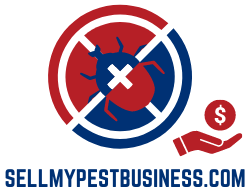How to Determine the Value of Your Pest Control Business (Part 1: Financial Metrics)
Understand revenue, profit margins, and financial documentation to assess your business value.

Introduction
Determining the value of your pest control business is an essential step in planning for growth, a sale, or improving operations. While many factors contribute to a business’s valuation, financial metrics serve as the cornerstone. Buyers focus heavily on revenue trends, profit margins, and financial documentation when assessing a company’s worth. This blog post explores how these financial elements play a role in determining the value of your pest control business.
1. Revenue Trends: Stability Attracts Buyers
Revenue is the lifeblood of any business, but it’s not just the total revenue that matters—trends over time play a significant role in valuation.
Why It Matters:
- Buyers are attracted to consistent or growing revenue trends over a 3–5 year period, which signal stability and reliability.
- Sharp fluctuations or declining revenue can be a red flag, indicating potential risks or poor market positioning.

Action Tips:
- Highlight periods of growth during your pitch to buyers, and explain any anomalies in revenue trends (e.g., seasonal fluctuations or one-time expenses).
- Diversify revenue streams by offering additional services such as termite control or wildlife removal to increase income.
- If revenue has been flat or declining, implement strategies like upselling current customers or launching targeted marketing campaigns to boost short-term sales.

2. Profit Margins: Bigger Isn’t Always Better
Profit margins reveal how efficiently your business converts revenue into profit.
Why It Matters:
- A pest control business with high profit margins signals effective cost management and operational efficiency, making it more attractive to buyers.
- Buyers will scrutinize gross profit margins, operating profit margins, and net profit margins to assess your company’s financial health.
Action Tips:
- Conduct an expense audit to identify areas where costs can be reduced without compromising service quality, such as optimizing route planning or automating administrative tasks.
- Highlight your average profit margin during negotiations to emphasize your business’s efficiency and profitability.
- Benchmark your margins against industry standards to demonstrate competitive strength.
Example:
A pest control business with a consistent 20% net profit margin and low operational costs will likely command a higher valuation than a business with a similar revenue but a 10% margin.
3. Recurring Revenue Streams: A Secure Future
Recurring revenue streams are a major selling point for pest control businesses, offering predictable income and reduced financial risk for buyers.
Why It Matters:
- Recurring contracts, such as annual service agreements, create financial stability that is highly attractive to buyers.
- Buyers view these contracts as a sign of customer loyalty and future profitability.

Action Tips:
- Transition one-time service customers to recurring contracts by offering discounts or subscription models.
- Maintain detailed records of contract lengths, renewal rates, and average contract values to present to potential buyers.
- Focus on retaining high-value commercial clients, as these contracts are typically more lucrative and long-term.

4. Clean Financial Documentation: Building Buyer Confidence
Transparent and accurate financial records are critical in building buyer trust and ensuring a smooth due diligence process.
Why It Matters:
- Buyers rely on your financial documentation to assess your business’s stability and legitimacy.
- Incomplete or disorganized records can delay the sale process, lead to renegotiations, or even cause deals to fall through.
Action Tips:
- Prepare comprehensive financial statements, including income statements, balance sheets, and cash flow statements for the past 3–5 years.
- Work with a certified accountant to ensure your records are accurate, clean, and professional.
- Include a detailed list of assets, such as equipment, vehicles, and real estate, as part of your documentation.
Pro Tip:
Consider conducting a professional audit before listing your business for sale. While this involves upfront costs, it provides buyers with added confidence, often resulting in a higher valuation.
5. Tax Compliance and Liabilities
Tax history is a crucial aspect of financial due diligence.
Why It Matters:
- Outstanding tax liabilities can scare off buyers or lower your business’s valuation.
- Clean tax compliance records streamline the sale process and reduce legal risks.

Action Tips:
- Resolve any outstanding tax issues or discrepancies before putting your business on the market.
- Provide buyers with copies of your last three years of tax returns to demonstrate compliance.
- Consult with a tax advisor to identify potential deductions or credits that could improve your financial standing before a sale.

6. Cash Flow Management: A Vital Indicator
Cash flow is often considered the lifeblood of small businesses.
Why It Matters:
- Consistent and positive cash flow is a sign of financial stability and operational efficiency.
- Buyers prefer businesses with strong cash flow, as it indicates the ability to cover operating expenses and generate profits.
Action Tips:
- Optimize cash flow by negotiating better payment terms with vendors and offering incentives for early payments from customers.
- Regularly monitor cash flow statements and address any negative trends immediately.
- Use financial software to track cash flow in real-time and ensure accuracy in your reporting.
Conclusion
Revenue trends, profit margins, and financial documentation form the backbone of a pest control business valuation. By optimizing these metrics, you can present your business as a secure and profitable investment opportunity.
In the next post, we’ll explore operational and market factors that can further enhance your business valuation. Ready to take the next step? Visit SellMyPestBusiness.com for expert guidance and a free consultation.
